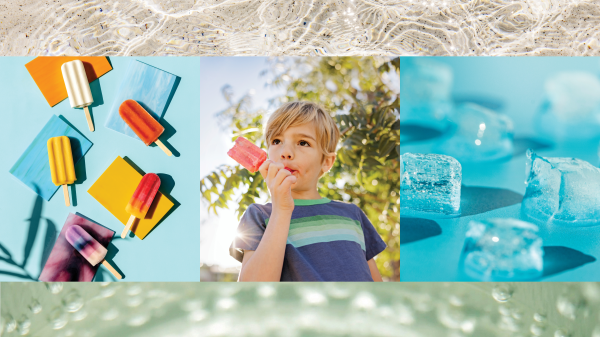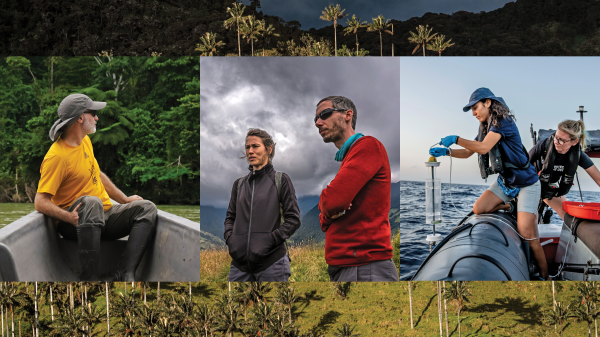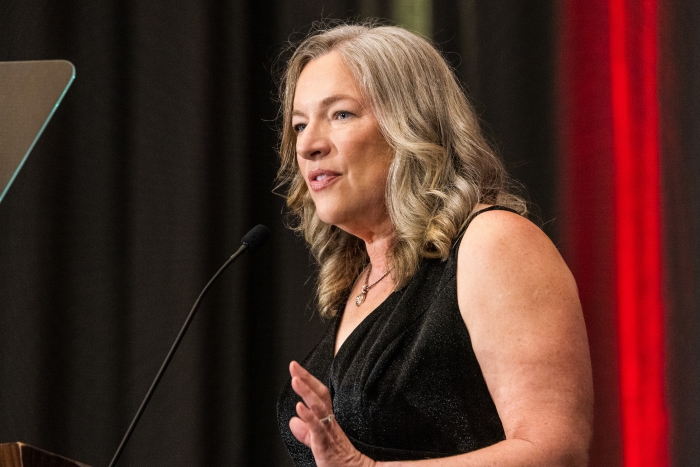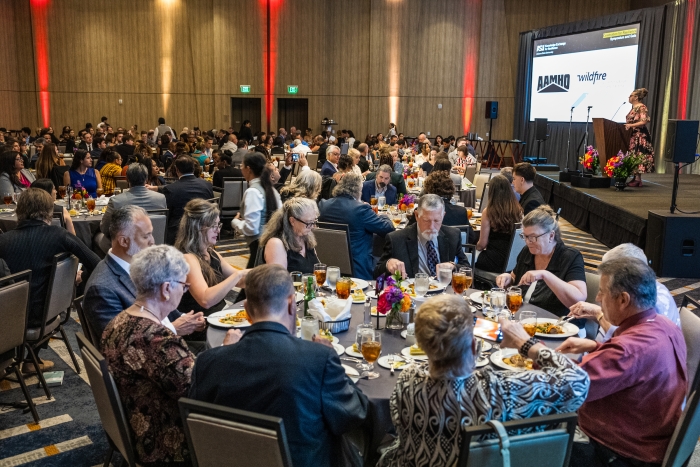Scientists, thought leaders gather to champion community resilience

Economist, policy advocate and author Heather McGhee delivers the keynote address at the Celebration for Resilience event at the Omni Tempe Hotel at ASU on Thursday, Sept. 19. The New York Times bestselling author discussed themes from her book "The Sum of Us." Photo by Charlie Leight/ASU News
More than 300 leading scientists, researchers and thought leaders from across the country gathered Sept. 19 at the Omni Tempe Hotel at ASU to reward resilience.
The Celebration for Resilience 2024 Symposium and Gala culminated with an evening gala where this year’s ASU Resilience Prize winner was announced and New York Times bestselling author Heather McGhee inspired the audience with ideas from her book “The Sum of Us: What Racism Costs Everyone and How We Can Prosper Together.”
The daylong event was hosted by Arizona State University’s Knowledge Exchange for Resilience, otherwise known as KER.
KER is a collaborative network championing community resilience in Maricopa County. It utilizes applied research to address complex challenges related to urban heat, healthy communities, housing and more.
“Resilience is about what we can achieve together,” said Libby Wentz, vice provost and dean of the Graduate College and director of KER. “It is about recognizing that our connections are our greatest asset, that every challenge we face is shared and that every solution we find is a victory for all.”
The evening celebrated the many contributions made by KER and the community since its inception six years ago when it was funded by a gift from Virginia G. Piper Charitable Trust.
“We have created positions on resilience and heat that did not exist before — influencing new legislation, developing new language for federal programs and introducing hundreds of people to one another so that collectively we can continue to have impact,” Wentz said.
Rewarding resilience
Community health organization Valle del Sol received the 2024 Resilience Prize, which is awarded to a group or organization in Arizona that demonstrates a longstanding commitment to building community resilience through data, partnerships and system change.
Valle del Sol’s Hispanic Leadership Institute was created in 1986 to address the lack of Hispanic leadership in city, state and board positions. Each year, the institute graduates 100 leaders that make a commitment to serving the community in some capacity.
In addition, Patricia Solis, executive director of KER, recognized two longtime community partnerships that have helped make real impacts for Arizona over the past six years — Wildfire and the Arizona Association of Manufactured Home Owners, or AAMHO.
Wildfire, an advocacy group focused on ending poverty, shared data that helped discover people living in mobile or older manufactured homes in Arizona that were vulnerable to heat.
AAMHO partnered with KER to develop solutions for these vulnerabilities, including making recommendations for addressing power outages, creating a heat solutions guide and other resources.
When they learned that some Arizona residents were not allowed to use air conditioning units in their windows, testimonies from Wildfire and AAMHO helped pass a landmark law that prohibits landlords from refusing to allow tenants to use cooling solutions.
“We believe it is saving lives this summer,” Solis said.
The Governor's Office of Resiliency was also honored. The new office was established by an executive order to address the record-breaking heat in the summer of 2023. That order led to the development of a statewide approach for the next heat season and the creation of the “State of Arizona Extreme Heat Preparedness Plan.”
'The Sum of Us'
During McGhee's keynote address, the renowned policy advocate posed the question: “Why can’t we all have nice things?” — referring to health care and affordable housing.
She said that historical public policies, such as President Franklin D. Roosevelt's "New Deal" — which helped build the country’s largest middle class by creating jobs, educational opportunities (the GI Bill), homeownership and social security — ultimately excluded the Black community.
“This idea of this broad consensus for a public good with an asterisk that then disappeared once it included all the public, including members of the public that the white majority of our country at the time had been taught were not good, was a huge ‘aha’ for me,” she said.
McGhee also talked about the deception of the “zero sum theory” that may contribute to inequality.
“It's a story that says that there's sort of a fixed pie of well-being,” she explained. “If I get a bigger slice, you must get a smaller slice. ... Our collective economic progress is being held back by the lie of the zero sum story.”
Disillusioned by this and a career at a research and advocacy organization where efforts to change public policies were thwarted, McGhee explained how she quit her job and took a cross-country journalistic journey with her son and husband to discover stories of solidarity and hope.
Those stories inspired her book “The Sum of Us,” which introduces the concept of the "solidarity dividend" — that gains can be achieved when people come together across racial lines to create a more equitable society.
“Through compassion and understanding, people can roll up their sleeves and link arms across race and find solidarity dividends,” she said. “That is the superpower — real gains like cleaner air and parks, higher wages, better public schools, all through cross-racial solidarity.
"That's what we talked about all night — partnerships that are bringing cool air to people in manufactured homes. ... We can solve these problems together. These are all solidarity dividends.”
After spending countless hours on the road researching her book, the author said she believes “there is real change happening in this country."
"We are finally beginning to jettison these old ideas and come together and use knowledge for the public good; putting community at the center of solutions," she said. "And we know that it won't just benefit some of us when we do that — it will benefit all of us.”
More Environment and sustainability

A water fix that takes on the yuck factor
Written by Christy Spackman, an ASU assistant professor and senior global futures scientist. This essay is adapted with permission from an article in Issues in Science and Technology from her book, “…

At home in the wild
By Kristin ToussaintEditor's note: This story is featured in the winter 2025 issue of ASU Thrive.Way up in the Andes mountains in Colombia, wax palms stretch their towering, skinny trunks into the…

Switching to 'green' plastic alone won’t solve the plastic problem, study shows
Plastic is everywhere. Today alone, you have probably already touched a whole lot of it, whether it’s your phone case, sunglasses, a grocery bag or your water bottle. It’s no news that plastic…



